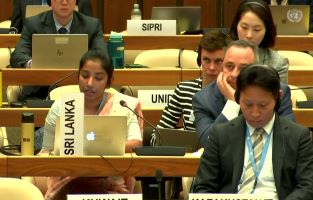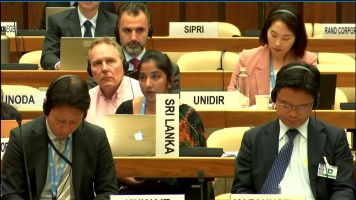
Thank you Mr. Chair,
Our comments at this point are with regard to paragraph 25 on legal review. It is the understanding of our delegation that legal reviews with regard to autonomous weapon systems should be inline with the already existing obligations under Art. 36 of the Additional Protocol I and that we should not in anyway agree to obligations on legal review for autonomous weapon systems that are weaker than the already existing obligations under Art,36. It is also recalled that most provisions of the Additional Protocols have gained the status of customary international law. We also note that the obligation under Art 36 of the Additional Protocol I finds its basis in article 35 of the Protocol which provides that the right of states to choose means and methods of warfare is not unlimited.
Art. 36 requires to determine whether the employment of weapons, means and methods of warfare would, ‘in some or all circumstances’ be prohibited by international law. In this sense we believe that the legal review process should consider whether the use of an AWS is in compliance with international law “ in some or all circumstance” and we therefore suggest to make this change in the text. We also support the suggestion by the Swiss delegation as well the delegation of Ireland now to delete the words “ seek to” in this section.

On the International Tea Day, the local tea industry is celebrating impressive achievements by the smallholder sector despite facing an array of unprecedented challenges posed by the economic challenges and the currency collapse.
“It goes without saying that the local tea industry has faced many demanding issues, but on this year’s International Tea Day, we want to celebrate the resilience of our smallholder tea growers, who have overcome pandemic adversity to be back on track to reach high profitability levels,” says Niraj de Mel, the Chairman of the Sri Lanka Tea Board.
“The smallholder sector has already achieved so much in terms of sustainability in the past couple of decades that is worth celebrating. This is a new chapter in the story of Ceylon Tea,” he added.

The 2nd Experts Meeting on the Migration Partnership between Sri Lanka and Switzerland was held on 16 May 2023 at the Ministry of Foreign Affairs. The meeting was co-chaired by Director General/Europe & North America the Ministry of Foreign Affairs of Sri Lanka Shobini Gunasekera, and Ambassador Vincenzo Mascioli Director of International Affairs, State Secretariat for Migration (SEM), Federal Department of Justice and Police (FDJP) of Switzerland.
The meeting reviewed the progress made under the Migration Partnership since its launch in 2016 and discussed the priorities and challenges for the future. The two sides reaffirmed their commitment to enhancing bilateral cooperation on migration issues. They also exchanged views on current migration trends, developments, and avenues for promoting employment opportunities in Switzerland for skilled workers from Sri Lanka. Both sides agreed to explore possible future cooperation in the hospitality sector, especially sustainable tourism and also in the fields of vocational training, skills development and sustainable reintegration.

With regard to paragraph 21 on limitations we would like to state at the outset that in our view the purpose of the imposition of these limitations is to ensure ‘ meaningful human control’ in weapon systems on the premise that autonomy in weapon system cannot be unlimited. We do not agree with the argument that the limitations imposed during the stages of development, deployment and use go beyond the existing IHL requirements. To the contrary these limitations are essential to ensure meaningful human control is retained in weapon systems which would be the only way to ensure in turn that these weapon systems in compliance with IHL.
The chapeau of paragraph 21 should refer to international law and to IHL in particular since complexity of these weapon systems pose a challenge not only to IHL but to the broader regime of international law. We also request to remove the qualifier ‘where appropriate’ in this section as these limitations should be upheld at all times. We stress once again the importance of these limitations as well as the prohibitions with regard to autonomous weapon systems codified in the form of a binding legal instrument to ensure their compliance rather than “possible voluntary measures” left for the discretionary implementation of national mechanisms.

With regard to paragraph 21 on limitations we would like to state at the outset that in our view the purpose of the imposition of these limitations is to ensure ‘ meaningful human control’ in weapon systems on the premise that autonomy in weapon system cannot be unlimited. We do not agree with the argument that the limitations imposed during the stages of development, deployment and use go beyond the existing IHL requirements. To the contrary these limitations are essential to ensure meaningful human control is retained in weapon systems which would be the only way to ensure in turn that these weapon systems in compliance with IHL.
The chapeau of paragraph 21 should refer to international law and to IHL in particular since complexity of these weapon systems pose a challenge not only to IHL but to the broader regime of international law. We also request to remove the qualifier ‘where appropriate’ in this section as these limitations should be upheld at all times. We stress once again the importance of these limitations as well as the prohibitions with regard to autonomous weapon systems codified in the form of a binding legal instrument to ensure their compliance rather than “possible voluntary measures” left for the discretionary implementation of national mechanisms.

As this is the first time my delegation takes the floor, we wish to congratulate you and assures you of our full support as we approach the final stage of this year’s GGE which we believe marks a significant turning point on the future direction on the issue of regulation of the use of autonomy in weapon systems.
In this light we commend the significant efforts you and your team have put on in presenting the draft report of the 2023 session which we consider as a good basis to commence our work for this session.

As this is the first time my delegation takes the floor, we wish to congratulate you and assures you of our full support as we approach the final stage of this year’s GGE which we believe marks a significant turning point on the future direction on the issue of regulation of the use of autonomy in weapon systems.
In this light we commend the significant efforts you and your team have put on in presenting the draft report of the 2023 session which we consider as a good basis to commence our work for this session.
